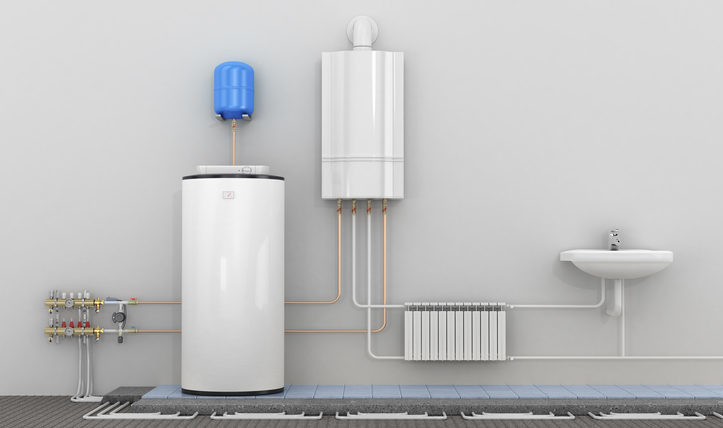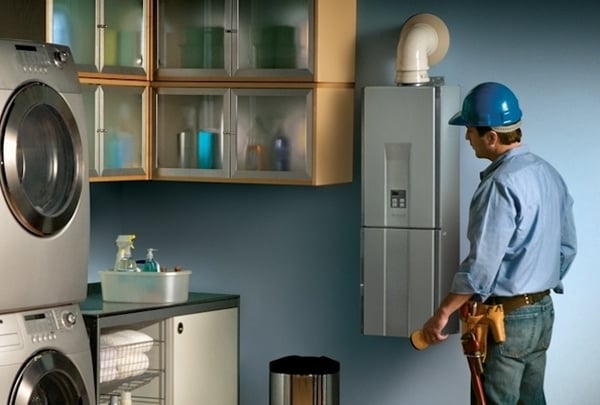What're your ideas on Unveiling the Hot Trend: The Benefits of Tankless Water?

In a globe where comfort and performance reign supreme, it's no surprise that property owners are frequently looking for smarter ways to handle their home's energy intake and comfort. One technology that has actually progressively gained appeal is the tankless water heater. But just what makes these systems stand out from the standard tank-based designs most of us grew up with? Allow's dive in and discover the advantages of tankless water heaters, helping you choose if it's time to make the switch in your home.
Introduction
Picture this: you step into the shower after a lengthy day, expecting a relaxing waterfall of hot water, just to be welcomed by icy droplets because the last individual utilized it all up. Sound familiar? Typical water heaters keep a fixed quantity of warm water, indicating you go to the grace of that tank's supply. Tankless systems, on the other hand, heat water on demand. No more running out mid-shower, no more wrestling with routines just to guarantee hot water is readily available.
Recognizing Tankless Water Heaters
What Are Tankless Hot Water Heater?
Tankless water heaters, sometimes referred to as on-demand or immediate water heaters, offer warm water just as it's required. Instead of storing gallons of pre-heated water, these units kick into action the moment you switch on the tap. Water goes through a warm exchanger, heating up in real-time, implying you obtain a nonstop circulation of warm water without the requirement for a huge container sitting idly by.
How Do They Differ from Traditional Solutions?
Traditional heaters hold a storage tank of hot water, making use of energy to keep that tank at a regular temperature level. Tankless devices get rid of the standing supply, reducing lost energy and the cumbersome footprint of a large cyndrical tube. Essentially, you're upgrading from a "stockpile" frame of mind to a "made-to-order" approach.
Typical Types of Tankless Systems
Tankless water heaters generally come in two varieties: gas and electric. Gas models tend to supply greater flow prices, perfect for larger homes, while electric designs commonly serve smaller homes and are usually simpler to mount. Additionally, some systems are made for point-of-use (offering one component) while others can deal with the whole home's hot water demands.
Secret Advantages of Tankless Hot Water Heater
1. Unlimited Warm Water Supply
Ever had to set up showers so every person gets their fair share of warm water? With tankless, that comes to be a thing of the past. As long as the heating system's flow capability isn't surpassed, you can take back-to-back showers without becoming a popsicle.
2. Power Effectiveness and Expense Savings
No more heating a giant container's well worth of water and maintaining it warm throughout the day. Tankless heating units decrease standby power losses, which can lower utility costs. While the initial cost could be greater, the long-lasting financial savings often justify the financial investment.
3. Space-Saving Layout
If your home is short on storage space, getting rid of the cumbersome tank frees up important room. Tankless devices are portable and can typically be installed on wall surfaces, stashed in edges, or installed in tight utility storage rooms without grabbing all of the whole space.
4. Longer Lifespan
A well-kept tankless water heater can outlive its tank-based relative. Conventional storage tanks may last 10-15 years, while tankless versions can keep chugging along for 20 years or even more, making them a strong investment in time.
5. Improved Water Top Quality
Storing water in a container can often bring about sediment accumulation or a somewhat "off" preference. With tankless systems, fresh water is heated up on the spot, lowering the possibilities of sediment buildup and possibly providing cleaner-tasting water.
Considerations Prior To Switching
Though the advantages are compelling, it's important to take into consideration a couple of factors before completely dedicating.
Preliminary Financial Investment Prices
Tankless heaters typically come with a greater ahead of time price tag. In between the device itself and prospective installation modifications, the first price could give you sticker shock. But remember to watch it as a lasting financial investment.
Setup Demands
Depending upon your home's infrastructure, you could require extra electrical ability or gas line upgrades. Ensure you recognize the installation demands and consult with an expert to stay clear of shocks.
Reviewing Your Home's Water Usage Patterns
If your home simultaneously makes use of numerous components with high warm water need, see to it the unit's circulation price satisfies your needs. Knowing your use patterns aids you choose the ideal dimension and sort of tankless heater.
Maintenance and Treatment Tips
Tankless systems are reasonably low maintenance, however they aren't set-it-and-forget-it devices.
Normal Cleansing and Descaling
Tough water minerals can accumulate in the warm exchanger, affecting effectiveness. Normal descaling (often advised every year) keeps the device performing at peak performance.
Yearly Expert Inspections
A yearly checkup from a specialist guarantees minor problems are caught early. They'll examine the device's efficiency, try to find leakages, and assist keep optimal effectiveness.
Ensuring Appropriate Air Flow
For gas versions, correct ventilation is essential to safely remove exhaust gases. See to it airing vent systems are tidy and appropriately mounted to avoid any type of prospective security risks.
Comparing Different Brands and Models
Not all tankless hot water heater are developed equal.
Researching Reputable Makers
Search for credible brand names with a history of producing top quality units. A reputable manufacturer frequently gives better client assistance and longer guarantees.
Checking Out Reviews and Customer Feedback
Customer reviews and comments from next-door neighbors or good friends that have gone tankless can use valuable insights. Sometimes, real-life experiences can be much more telling than marketing pamphlets.
Setup: Do It Yourself or Professional?
While some property owners enjoy dealing with jobs themselves, tankless setup might not be the very best time to break out the toolbox.
Advantages and disadvantages of DIY Installation
A DIY mount can save money, but it features dangers. Inaccurate installment can result in inadequacy or safety and security problems. If you're handy and have experience, it may be practical-- yet wage caution.
When to Call a Professional Plumbing Technician
For many, calling a pro ensures every little thing's done properly. A professional plumber recognizes local codes, sizing demands, and airing vent criteria, decreasing the danger of problems.
Making best use of Efficiency
You've purchased a tankless unit-- now maximize its effectiveness.
Ideal Temperature Level Settings
Most people set their units in between 120-140 F. Readjusting the temperature level can improve convenience and financial savings. Experiment to locate a wonderful area that does not throw away power.
Coupling With Low-Flow Fixtures
Want to extend your device's capabilities? Consider installing low-flow showerheads and taps. They minimize water usage, allowing your tankless system to supply a consistent stream of hot water without stressing.
Ecological Effect
Tankless water heaters line up with greener living objectives.
Minimized Carbon Footprint
By utilizing less power and only heating water as required, tankless systems can lower your home's carbon impact, decreasing your ecological influence.
Conserving Natural Resources
Much less power consumption and less lost warm water translate into fewer natural resources being used, an environmental win-win.
That Profits The Majority Of from Tankless Heaters?
The charm of tankless heating systems is that they can fit a range of homes.
Huge Households vs. Single Owners
Huge families may like the endless hot water supply, while single occupants value the power cost savings from not heating up an entire tank for just one person's early morning shower.
Home Owners with Minimal Area
If your home is short on square footage, shedding the large tank liberates room for various other fundamentals-- or possibly just more elbow room.
Eco-Conscious Consumers
Going tankless aligns with environmentally friendly worths, ensuring you're not squandering energy or resources.
Future Trends in Tankless Water Heaters
The world of home devices is ever-evolving, and tankless hot water heater are no exception.
Smart Home Combination
Visualize changing your hot water heater's temperature level by means of an application or receiving maintenance notifies on your phone. As wise home tech breakthroughs, we'll see more connectivity and ease.
Advancements in Innovation
R&D is continuously enhancing warm exchangers, making units more efficient and durable. Future models could be also quieter, more compact, and better fit for differing environments.
Verdict
Picking a tankless hot water heater is greater than simply updating your home's warm water system; it's buying lasting convenience, power efficiency, and a greener lifestyle. By considering your home's water usage, bearing in mind installation demands, and devoting to routine maintenance, you can delight in a steady stream of warm water without the luggage of a cumbersome container. As technology advances, you can expect also smarter, much more reliable tankless options that not only make your life less complicated however additionally benefit the earth.
Why You Should Consider a Tankless Water Heater for Your Home
Energy Efficiency and Cost Savings
Tankless water heaters, also known as on-demand water heaters, heat water only when needed. This means they don't waste energy keeping a tank of water hot constantly. This efficiency translates into substantial cost savings on your monthly energy bills.
Endless Hot Water Supply
One of the significant advantages of tankless water heaters is their ability to provide a continuous supply of hot water. Traditional tank water heaters have a limited capacity and can run out of hot water, especially during peak usage times. In contrast, tankless water heaters can provide an endless stream of hot water, making them ideal for larger families or homes with high water usage.
Space-Saving Design
Tankless water heaters are compact and take up significantly less space compared to traditional tank heaters. They can be installed on walls, under cabinets, or even outside, freeing up valuable space in your home. This makes tankless water heaters a great option for smaller homes or properties with limited space for a traditional water heater.
Longer Lifespan and Lower Maintenance
Tankless water heaters typically have a longer lifespan compared to traditional tank heaters. They can last up to 20 years or more with proper maintenance. Additionally, tankless systems are designed with replaceable parts, which can extend their lifespan further and reduce long-term maintenance costs.
Environmentally Friendly
Reducing energy consumption not only saves you money but also benefits the environment. Tankless water heaters contribute to a smaller carbon footprint by using less energy to heat water. Their energy efficiency and ability to minimize standby heat loss make them an eco-friendly choice for environmentally conscious homeowners.
Customized Temperature Control
Tankless water heaters offer precise temperature control, allowing you to set the desired temperature to meet your specific needs. This level of customization ensures you always have water at the perfect temperature for your comfort and usage requirements.
https://beantownservices.com/blog/consider-tankless-water-heater-for-your-home

We had been shown that write-up on Why You Should Consider a Tankless Water Heater through an associate on our other web page. Do you know about somebody who is sincerely interested in the niche? Take a moment to share it. Bless you for your time. Return soon.
Schedule
 Yasmine Bleeth Then & Now!
Yasmine Bleeth Then & Now! Amanda Bearse Then & Now!
Amanda Bearse Then & Now! Andrew Keegan Then & Now!
Andrew Keegan Then & Now! Jenna Von Oy Then & Now!
Jenna Von Oy Then & Now! Tonya Harding Then & Now!
Tonya Harding Then & Now!